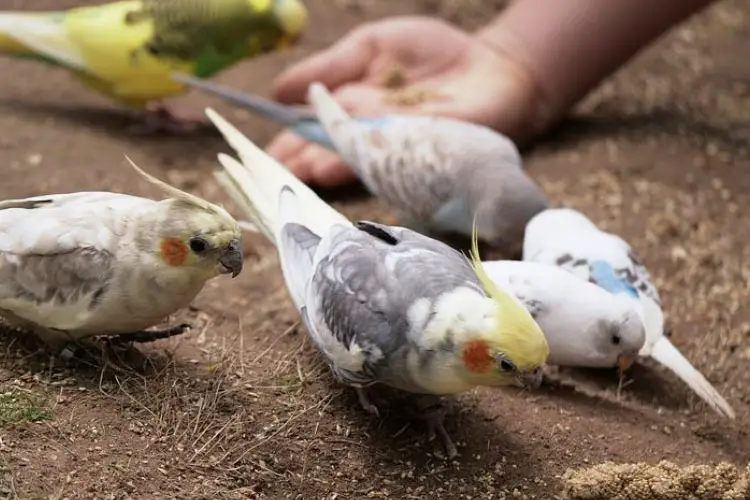Cockatiels and budgies are very sensitive to cold weather and catch a cold very easily. So, if you have them as pets, then you might want to look out for their cold symptoms. It’s not unusual to feel helpless watching them suffer from a cold.
Cockatiel and Budgie Cold Treatment: What to do to help? Once you diagnose them with a cold, it is always wise not to try any treatment by yourself. Therefore, consult with a vet and carry on the treatment as prescribed. However, keeping them in a warm atmosphere and trying out some home remedies with proper caution can fasten their recovery.
In this article, we are going to discuss various aspects of cockatiel and budgie cold treatment and how you should approach the issue. If you are concerned about it, please go through the article.
Cockatiel And Budgie Cold Treatment: Try Some Common Methods
Budgie and Cockatiel can’t cough like humans as they don’t have any diaphragm. They just make sounds like coughing and sneezing. If you notice your cockatiel and budgie sneezing frequently, have runny noses, and are more sensitive to things than usual, they are suffering from a cold.
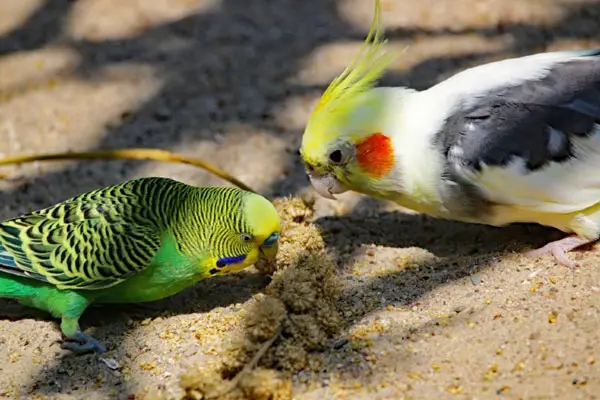
Hence, you need to take some extra care. Otherwise, it can turn out to be fatal for them. There are 3 steps to their cold treatment:
1. Visit a Vet
It’s a very important point of treatment. So, read carefully. Once you find out that your birds are sick, what will you do? Maybe you will try to treat them by yourself. But, I recommend you not to try this without consulting any vet.
You are not a vet, and you are not sure about the treatment. If you are most likely to treat your bird from your experience, then let us tell you, treatment for all colds might not be the same.
As a result, you will end up causing harm to your birds. So, consider your birds’ disease seriously and take veterinary care.
2. Vet Will Perform Tests to Determine the Right Treatment Module
A good veteran will perform a few physical examinations such as blood tests or taking pictures of different parts of birds’ bodies. His treatment will vary depending on the cause of the illness.
He might prescribe antibiotics or may change the diet of your cockatiel and budgie. Sometimes, he can only suggest more sleep and rest as your birds’ cold treatment.
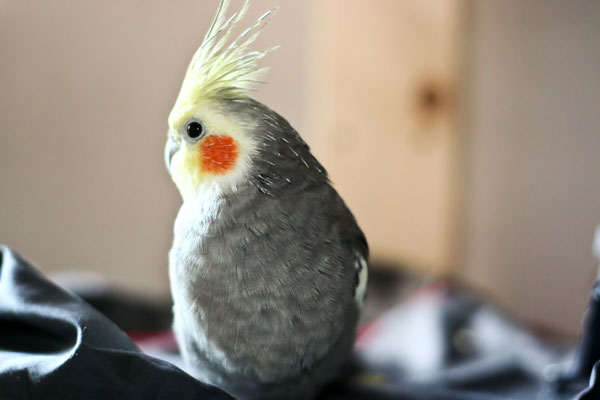
3. Respiratory Diseases Care
If the birds are diagnosed with respiratory infections due to a cold, they will need intensive care. They are very sensitive to respiratory conditions like chlamydophila and mycoplasma, which the birds can get through contact with their owners.
That’s why it’s better to keep a distance from your birds when you are sick. Also, check their breathing often to be sure about if they are having any respiratory problems or not.
What Is The Normal Temperature For Budgies And Cockatiels?
The common body temperature of a Budgie is 41°C. Its feet temperature is slightly low, and it’s generally 39°C. However, Budgie’s ideal range of temperature is 70-75° Fahrenheit. It can tolerate lower temperatures for the first 6 hours. But, after 12 hours, hypothermia will set.
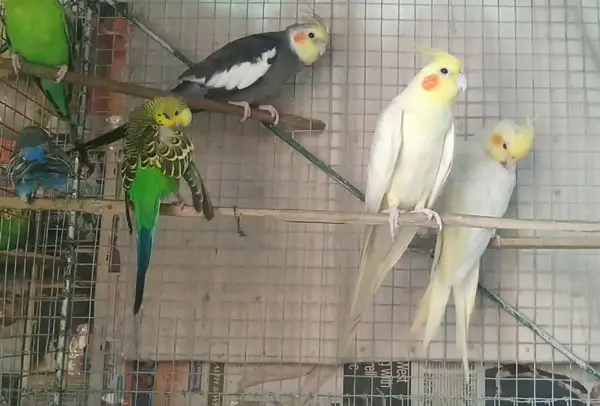
On the other hand, cockatiel possesses warmer body temperature than humans do. The body temperature of a cockatiel ranges between 102-112° Fahrenheit. Surprisingly, they chill faster with the dropping temperature of the room.
Causes of Cold of Cockatiels and Budgies
Generally, cockatiels and budgies are comfortable in warm weather. Also, they are unable to resist and adapt to frequent temperature changes. Besides, they have a high ability to infect each other with viruses.
Normally, cockatiels and Budgies in the wild don’t get wet habitually. However, in the case of pet birds, they are cleaned and washed regularly due to hygiene issues. The fact is that their features remain damp for a longer period after the washing process, which might cause them cold.
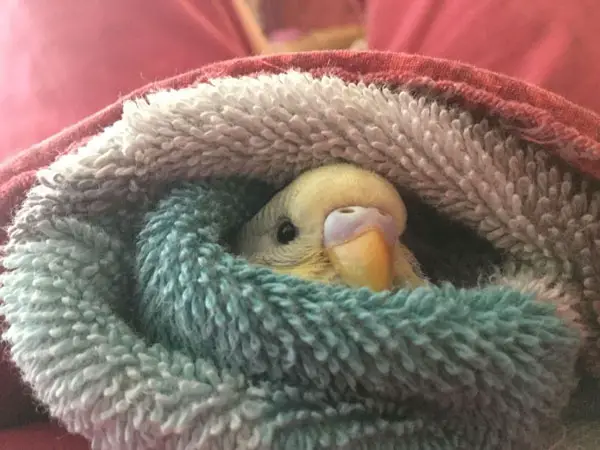
High humidity, constant changes in the temperate, and their sensitization due to changes in their nutrition also impact their immune system. Indeed, birds with weak immune systems are more susceptible to getting cold.
Cold Symptoms of Cockatiel and Budgie
Some cockatiels and Budgies won’t even show any sign of a cold. Their closed eyes will be a major sign of a cold for them. A few common signs of their cold are enlisted below:
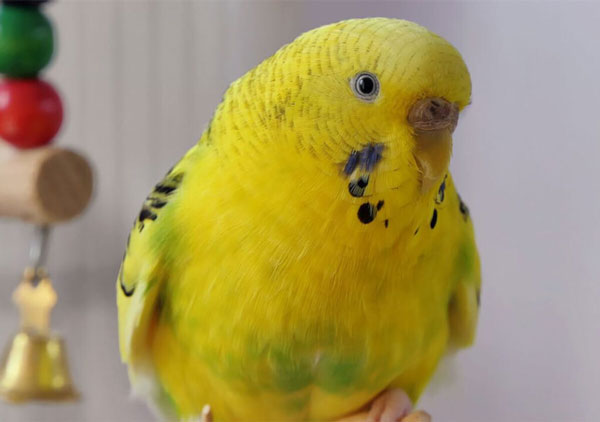
- Body temperature: The body temperature will be higher than ever for birds having colds. In that case, it is said that birds are having fever.
- Feet temperature: The cold feet of Budgie and cockatiel are a sign of their stress and excitement. When you fail to provide the ideal cage temperature for your birds, your birds will have cold legs for a longer time.
- State of their eyes: If your birds have a cold, they will show closed, semi-opened, or dropping eyes. Otherwise, your budgie and cockatiel will have normal open eyes.
- Sleeping habit: Your cockatiel and Budgie will sleep more when they have a cold.
- Breathing: If you notice that your birds are having difficulty and shortness of their breath, be sure that your birds have a cold. They might also suffocate within minutes due to their shortness of breath.
- Vocalization: Cockatiel and Budgie normally become quiet and vocalize less when they have a cold.
- Nasal discharge: Birds will sneeze frequently and also have a thick yellowish nasal discharge.
- Feather: Their feathers will keep falling out during their cold. Also, they will stop tidying their features during this period.
- Weight: Cockatiel and Budgie lose their appetite and also suffer from dehydration when they have acute rhinitis. Hence, there will be a reduction in their weight.
Not All Colds of Cockatiel and Budgie Are the Same
All colds in your cockatiel and Budgie may not be the same, and so will be the treatment. That’s why it’s necessary to have clear knowledge about those various types of colds. Here are a few types of colds of Cockatiel and Budgie:
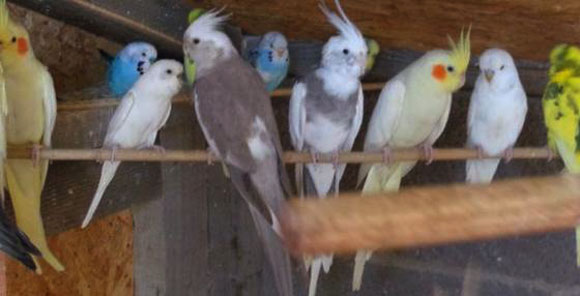
| Types of Colds | Transmission routes | Distinguishing symptoms |
| Viral | Spreads through aviary or flocks | Serious respiratory issues Systemic and neurological issues |
| Bacterial | Direct contact with a human having a cold Direct contact with avians Pasteurella and bordetella bacteria | Nasal secretions are yellowish, and also might be transparent Parts of the nose are harmed which will be permanent and won’t regenerate |
| Fungal | Aspergillosis passes from their hatchery to litter Candida is individual in every species | Part of the bird’s nose may be affected Antibiotics won’t work |
| Parasitic | Via oral or fecal route | Continuous sneezing Mycoplasma infection |
| Nutritional | Imbalanced diet Nutrition Deficiency | Cage layer fatigue Rickets |
Antibiotics in Their Cold Treatment
When your cockatiel and budgie have bacterial coryza, vets use antibiotics for their treatment. However, don’t use antibiotics without the supervision of a physician.
Because when the reason behind their cold is different, antibiotics may not work (drugs.com). Rather, it will do further harm to your favorite birds.
Home Treatment Method For Their Cold
Along with prescribed treatment by vets, you should also keep nursing your Budgie and cockatiel at home. Some effective remedies for treating their cold faster are:
- Keep your birds warm and provide essential heat therapy.
- Try to feed garlic to your budgie and cockatiel. Garlic is quite effective in killing cold bacteria. You can feed them garlic water or also mix small pieces of garlic with their food. It’s better to continue this method for 3 days.
- After feeding garlic, let your birds rest for 2-3 hours. Also, try to sun bask tour birds for 2-5 minutes.
To get a clear idea of how to provide them with home remedies, watch this:
Prevention of Cockatiel and Budgie Cold
It’s better to prevent cockatiel and Budgie cold than cure it. This will reduce the fatal risks for your pet birds. In this case, a few preventive measures that you should take are mentioned below:
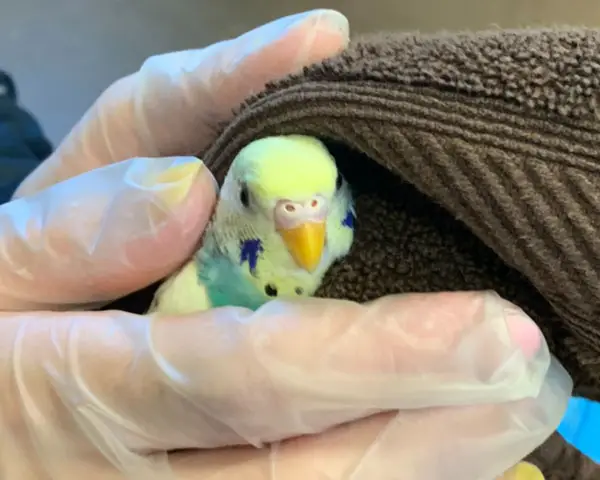
- Provide your budgie and cockatiel with a balanced diet
- Give opportunities to your pet birds for exercise
- Ensure that they have easy access to fresh water all the time
- Clean and wash your birdcage at least once a week
- Make sure the environment is stress-free for your budgie and cockatiel
- Visit vets regularly for the check-up of your cockatiel and budgie
- Complete all the vaccination of your birds’
Transmission of Cold Between Human and Cockatiel-Budgie
If you have a cockatiel and budgie as pets, then it’s normal to have doubts about whether they can transmit cold to you. To answer in short, no, they can’t transmit cold to you. But, there are high chances that you can cause rhinitis in your pet birds.
Normally, viral flu doesn’t affect pet birds. But, if your cold leads to any secondary bacterial infections, it can spread symptoms like congestion, flu, and cold to your budgie and cockatiel. So, it’s a wise decision to keep your distance when you are having coryza.
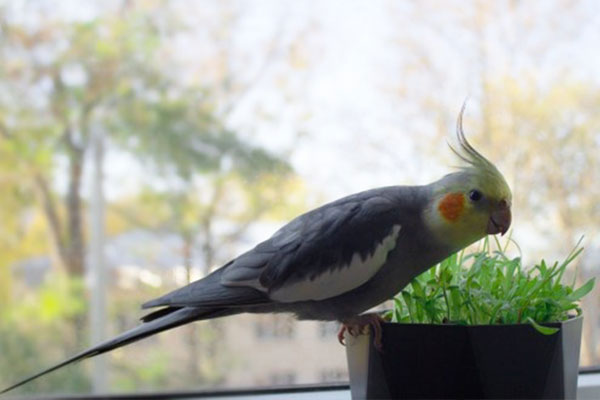
When you are sick, make sure you are not having too much contact with your birds. Also, wash your hands carefully before and after feeding and cleaning the cage of your birds.
Besides, don’t cough or sneeze around your birds. But to be on the safer side, you can wear a mask when your bird shows symptoms of a cold. Because they might suffer from psittacosis and influenza that can be transferred to you.
FAQs
Taking care of birds is a sensitive matter, and we understand a lot might be going through your head right now. To ease it off, we’ll answer some of the most frequent questions people have regarding this matter.
Budgies and cockatiels typically have body temperatures higher than 100° Fahrenheit. They can, however, endure temperatures as low as 40° Fahrenheit. However, prolonged exposure to temperatures below 40° Fahrenheit may be lethal.
Heaters and heat lamps are the quickest ways to get your cockatiel and Budgie warm. When a bird is kept close to heaters, it can be safely warmed. Similarly, heat lights provide a pleasant quantity of heat to a chilled bird.
When budgies and cockatiels are cold, they usually bury their beaks in their chest and lay their heads down. They may shiver as well.
Budgies and cockatiels typically sleep on one leg, with the other tucked up beneath them. However, they are sleeping on both feet and their feathers are puffed out, indicating that they are cold.
Conclusion
Cockatiel and Budgie cold treatment: what to do to help? They are very prone to catching colds and thus always keep an eye open for symptoms. However, it’s always wise to visit a vet, instead of treating them yourself.
We constantly advise against using unprescribed medications or treatment methods on them. As a result, those therapies may be lethal to your cockatiel and Budgie if performed without the supervision of a qualified veterinarian.
